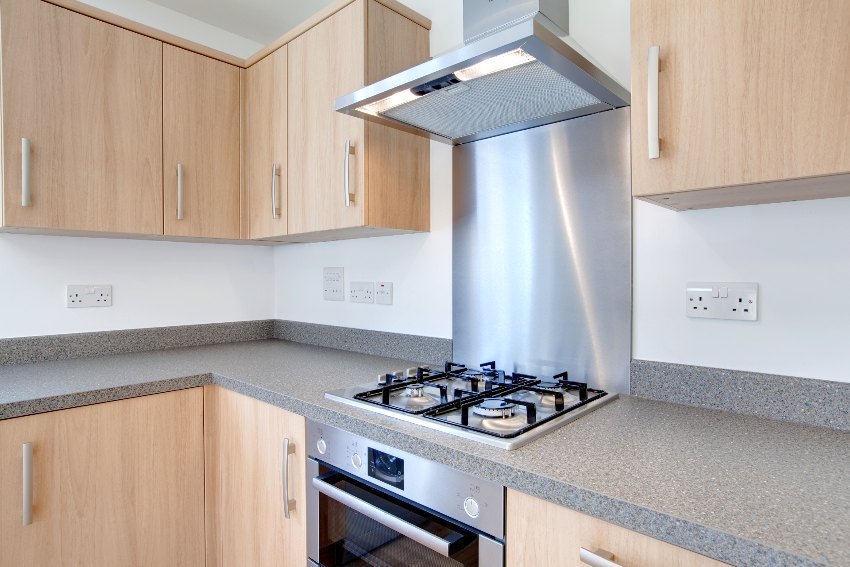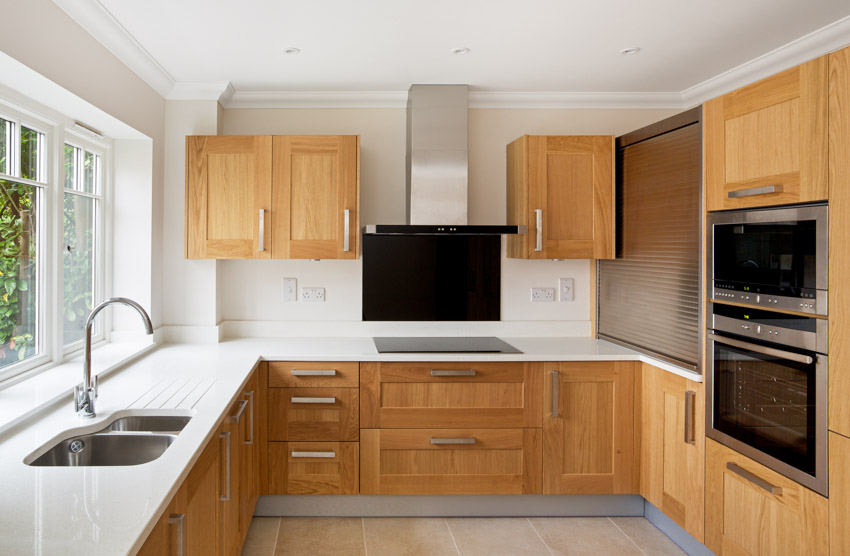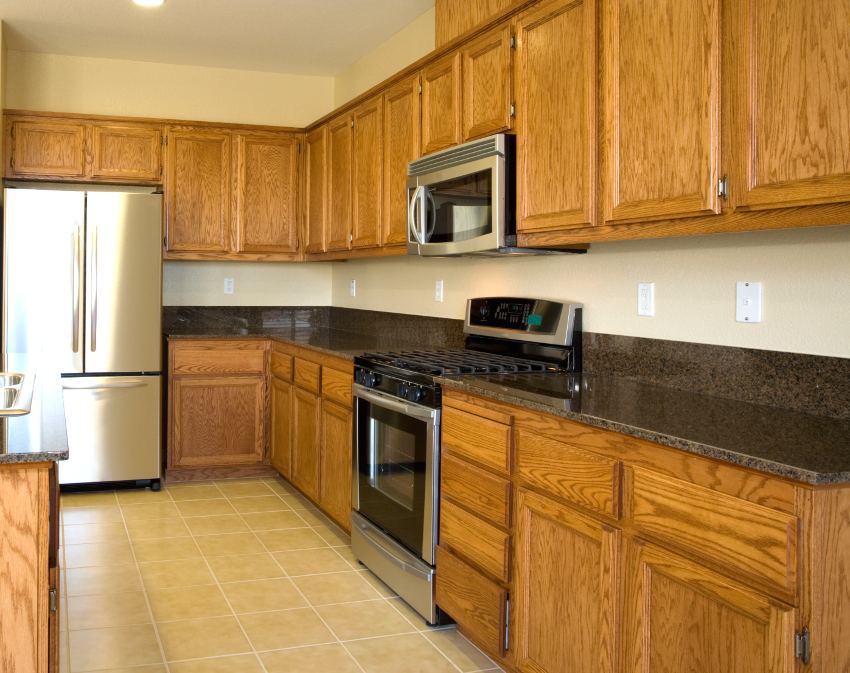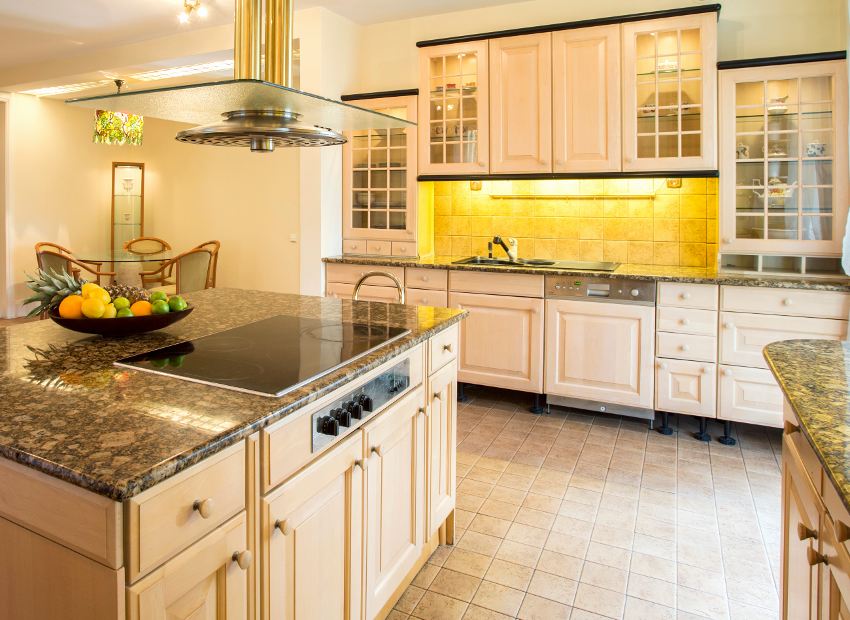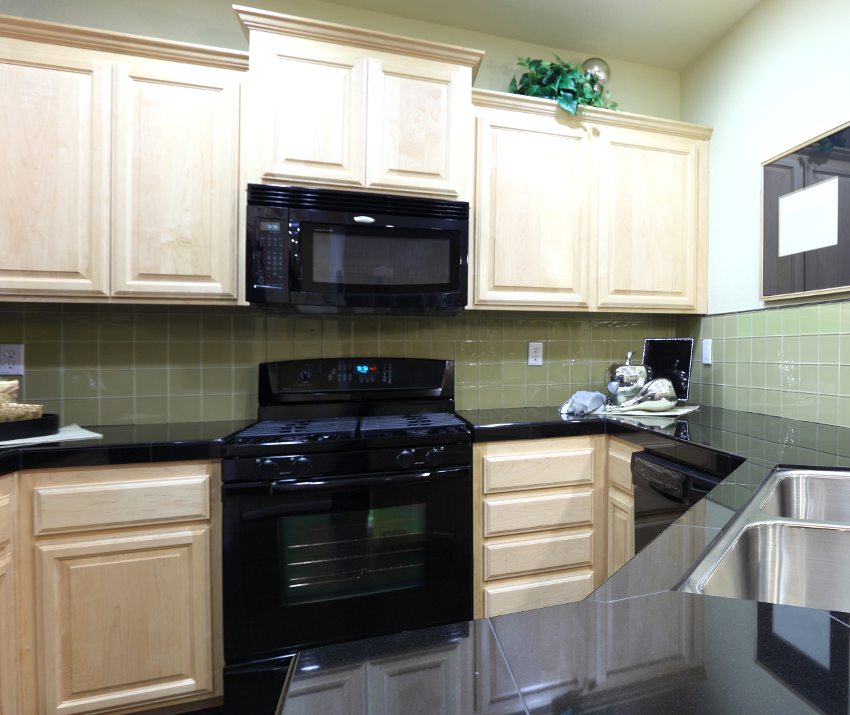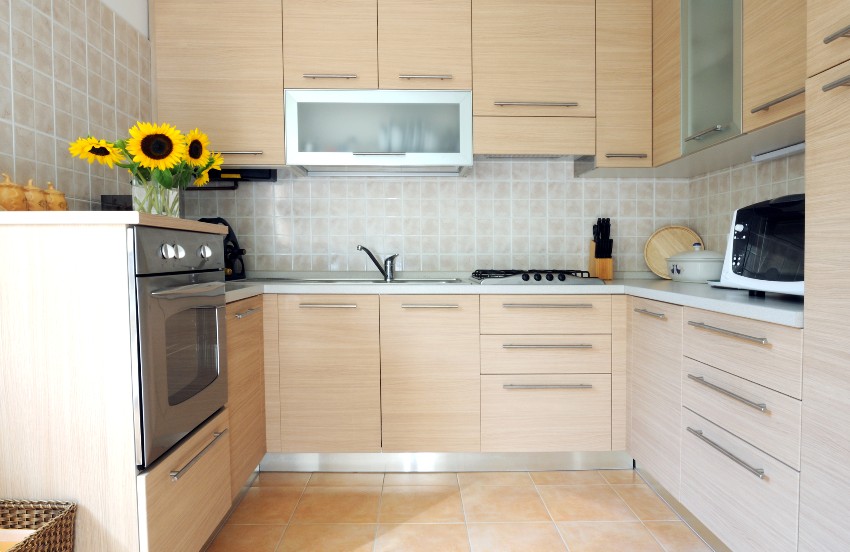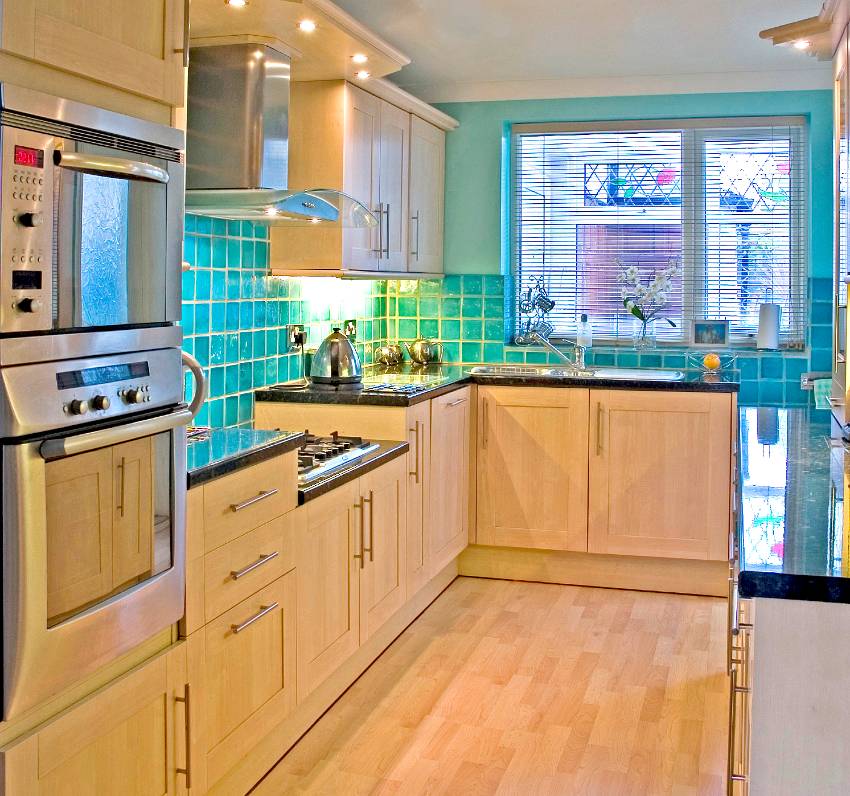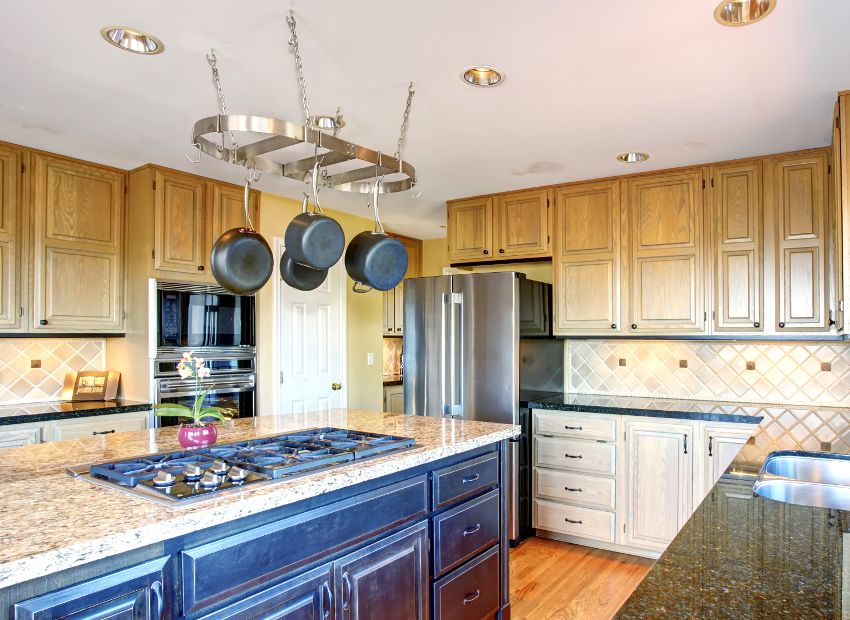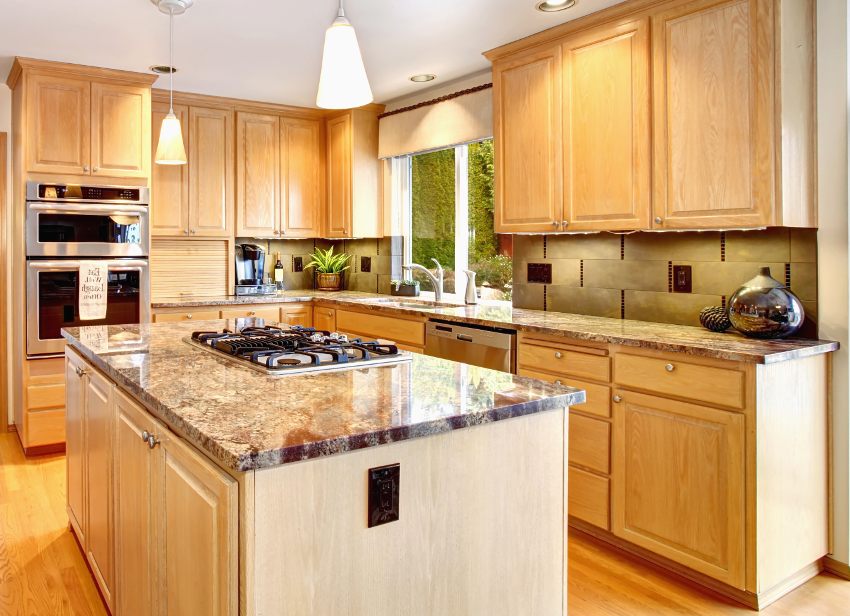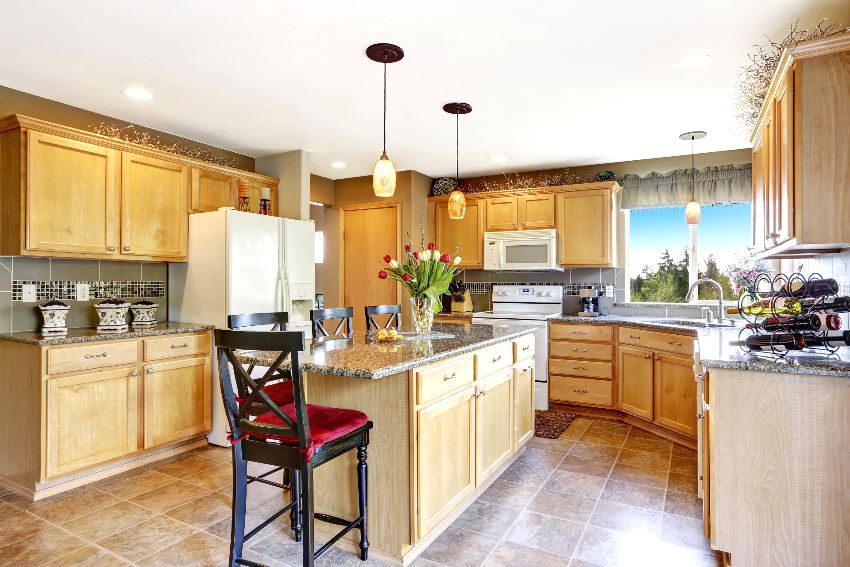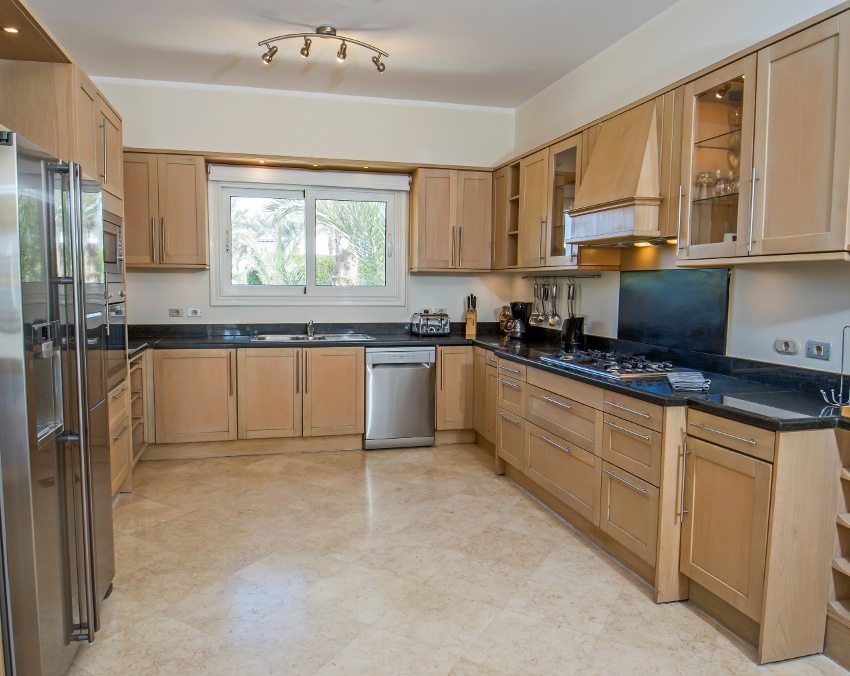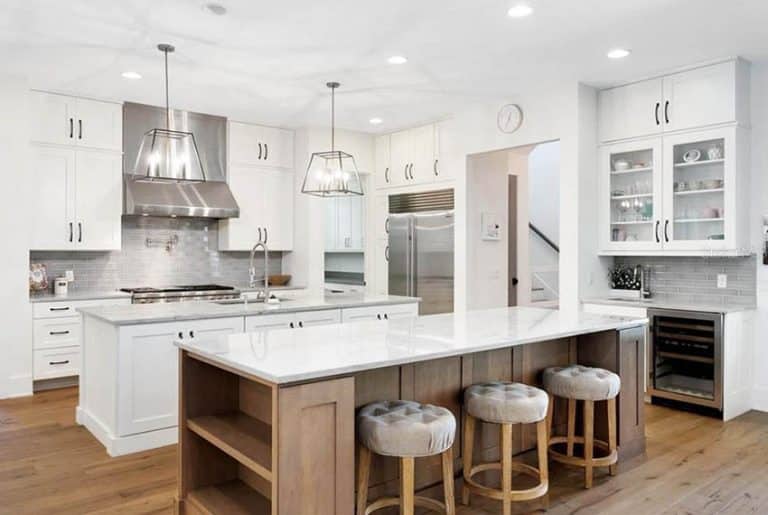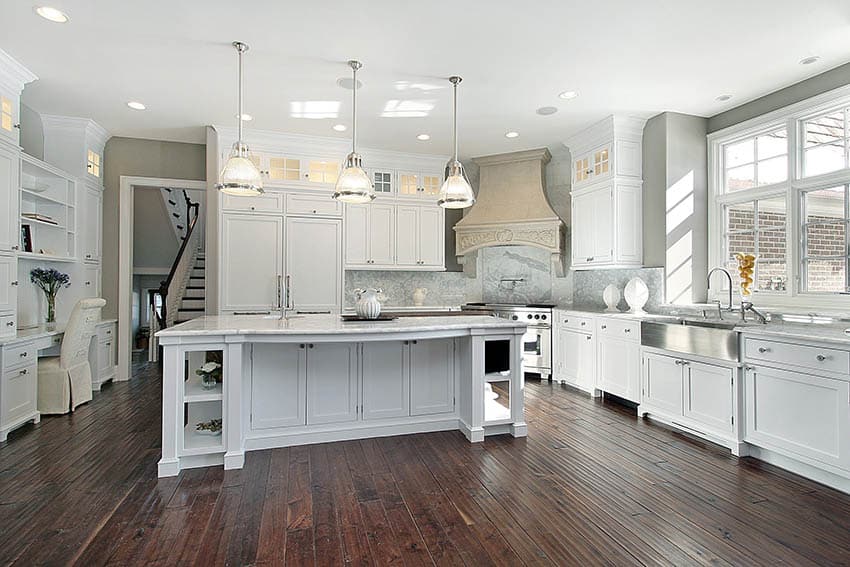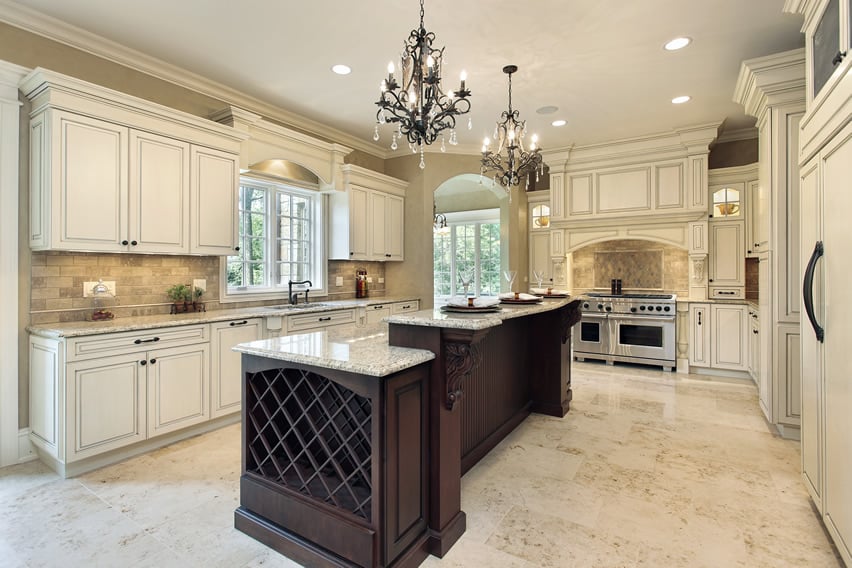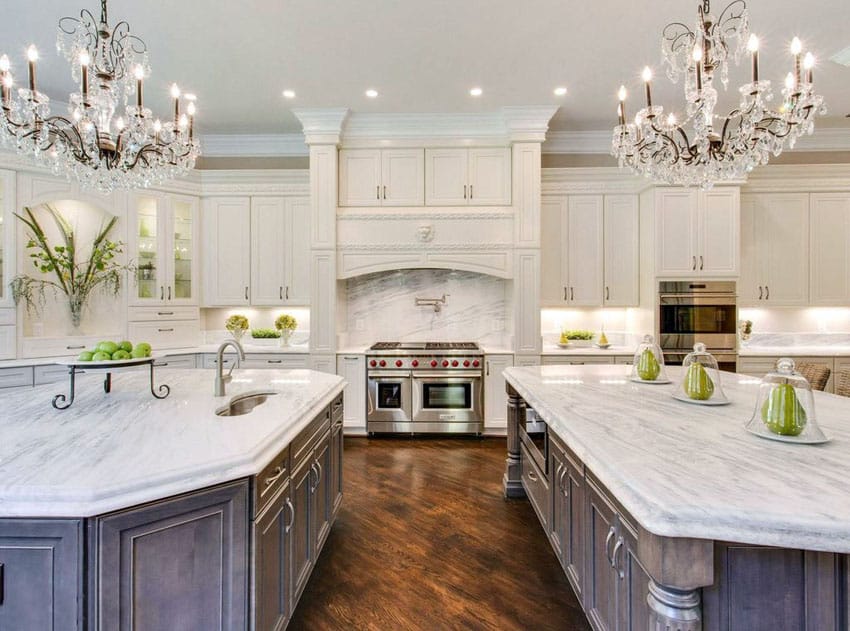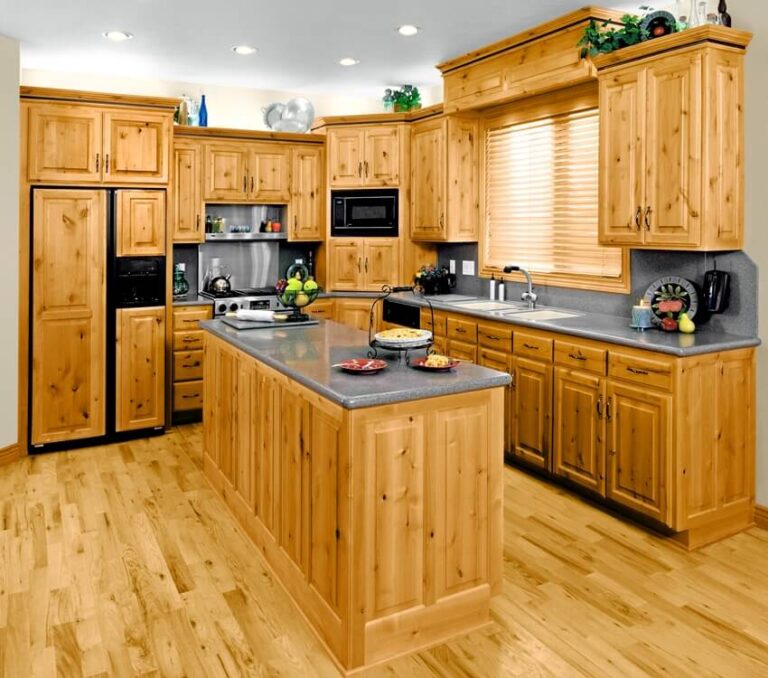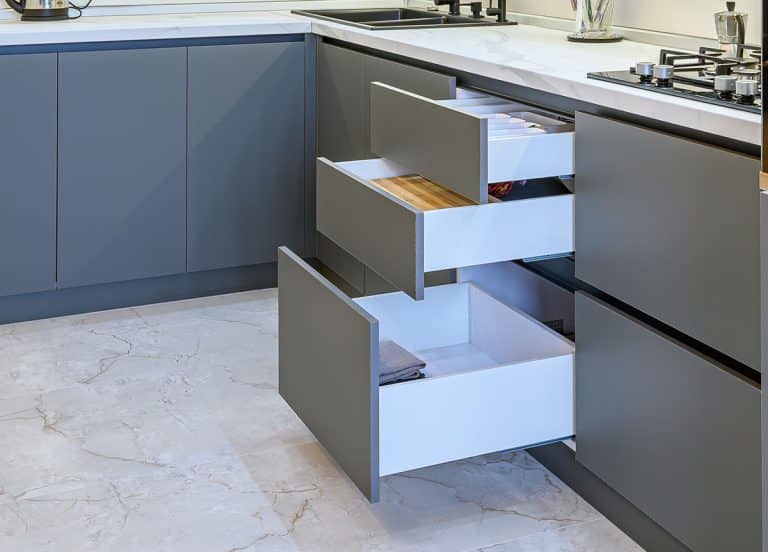White Oak Kitchen Cabinets (Types & Finishes)
Classically beautiful, oak is far more versatile and could be a great option for modern kitchens where it can replace white-painted cabinets to add a little extra warmth. White oak cabinets deliver many practical benefits associated with the natural characteristics of oak wood. It offers an aesthetic that is more than trendy as it is by itself visually pleasing with its clean, contemporary look.
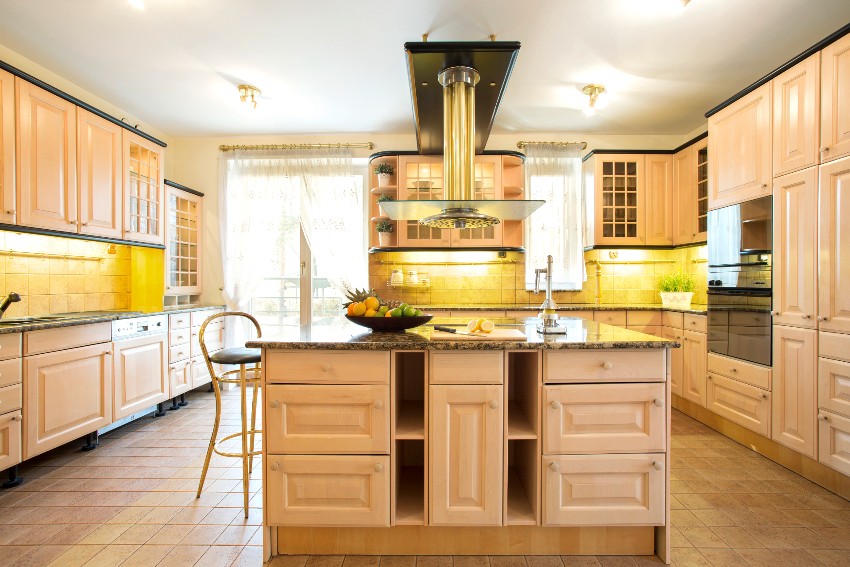
Benefits of White Oak:
- Durable and long-lasting for heavily used kitchens
- It retains a sophisticated look
- Beautiful grain patterns, including cathedral grain
- Complements dark shades for a trendy kitchen setting
- Adds dimension with contrasting elements
- Customizable with various wood stains
- Showcases natural texture
- Highly sought-after for consistency, strength, and durability.
What Are White Oak Cabinets?
White oak is more durable than many other types of hardwood, which makes it a top choice for heavily used kitchens. It can retain a sophisticated look without losing its durability.
It has beautiful grain patterns that were flat cut, which produces large cathedral grain patterns. Today, new styles of this wood are becoming popular, such as the quarter sawn and rift cut milling that changes the board look from cathedrals to straight grain.
Its milder hues pair well as contrast with dark shades of flooring, countertops, and tile to form an effortlessly trendy kitchen setting. Incorporating contrasting elements brings dimension to your kitchen.
There are a variety of wood stains that can be applied to give these kitchen cabinets a customized look and can also be incorporated in two tone kitchens.
As the grain on white oak cabinets is visible through stains, it is still best to go for natural, glazed, or varnished oak cabinets to better show off the natural texture of the wood.
North American white oak varieties are in the highest demand, and the most popular is the solid wood from Appalachia. It has the distinction of consistency, strength, and durability.
Is White-Oak Good For Cabinets?
With these cabinets, you can expect a sharp, sophisticated look and exceptional wear resistance that prevents dents, chips, or scratches. Durability is one of the most desirable aspects of this wood.
Unlike other hardwoods, it doesn’t soak in water; instead, it dispels water, making the cabinets sleek and sharp. It is also rot-resistant since it contains tannic acid, which repels insects.
It has a trendy color range, including wheat to greenish and brownish tones, that make its cabinetry fit perfectly in the color scheme and add sharpness to a modern kitchen.
White oak cabinets offer balance with countless other design elements in your kitchen and other interior spaces, including sleek stone countertops, brass light fixtures, and matte black finishes.
Hardness (Janka Score)
The Janka scale ranks different hardwoods based on their durability and determines the resistance to dents, scratches, water damage, insect infestation, and warping of a particular hardwood. The Janka test measures the force required to drive a .444-inch steel ball into the wood by half its diameter.
It is also a good indicator of how hard a species is to be manufactured. Boasting a hardness score of 1360 out of 4000, white oak is in the medium range of American hardwoods and the most durable of all hardwoods.
What’s The Difference Between Oak And White-Oak?
Oak is one of the most popular woods used in furniture and flooring in the US due to its high durability and easy to work with. It is one of the most efficient woods to burn due to the high BTU content. The grain pattern of oak wood makes it unique and, at the same time, one of the easier species to recognize.
The most common and popular species are red and white oak. To easily identify red oak from white lumber, check the ends of the boards.
Red oak will have open pores inside the growth rings on the end of the board, while white will have pores plugged with tyloses or balloon-like swellings.
White oak has a clear advantage regarding durability due to its moisture and rot-resistant quality. This makes it viable for cabinets subject to water or condensation.
White is slightly harder than red oak; according to the Janka hardness scale. White oak has a score of 1360, while red has 1290. White and red oak’s hardness scores are solid enough, making both lumber a good choice for kitchen cabinets.
When it comes to staining, both red and white take stain easily. White is better suited with gray and lighter hues of stains while using a medium to dark color will suit red oak due to its pinkish undertone.
White also has a unique ray fleck pattern, often times called “tiger oak” when perfectly quartersawn, while red varieties also have visible ray fleck patterns on its quartersawn surfaces, but it’s not the same size as that of the white. Red oak has a much stronger graining than white, which makes it appear smoother and helps hide scratches and dents.
In modern home styles, white oak offers more of a gentle hue, and the wood itself has a straight, even grain with clean lines that complement well with the neutral style of a modern interior design.
On the other hand, the deep coloring is one factor that makes red oak the best choice for traditional homes. The wood offers warmth that blends into the other classic and vintage elements of a traditional home.
The farmhouse design style is characterized by practicality and comfort, which offers the best aspects of both the modern and traditional styles. It takes the certain rustic beauty of a traditional design and combines it with some tasteful, simplistic features of the modern design. Both red and white types are good wood materials to use in a farmhouse design.
Due to its strong wood graining, the red oak hides scratches exceptionally well and prides itself on being a versatile color that fits several different aesthetics. At the same time, white varieties are easier to stain to personal taste, allowing you to dial in the colors and stains of your cabinets more precisely.
Is White-Oak Expensive?
There are a number of factors that contribute to the cost of white oak kitchen cabinets, including the type of cabinets purchased, the size of the kitchen, local labor, material, and hardware costs.
Stock oak cabinets for a standard-sized kitchen cost $4,000 to $5,000, while semi-stock or semi-custom cabinets cost $5,000 to $12,000.
Custom oak cabinets might cost a minimum of $8,000 to $20,000 or more. The average installation cost would likely be around 15 to 25 percent of the total cabinet costs.
It would almost cost $1,500 to $2,500 for installation if your oak cabinets cost $10,000. Other installers might charge $50 to $100 per cabinet, $50 to $100 per linear foot, or by the hour.
Types Of White-Oak Cabinets
White oak is included in a group of oaks of the genus Quercus in the beech family known as Fagaceae. It has longer grain rays and it is water-resistant.
The types of oak wood that fall under the white-oak group include:
• Bur Oak – is found mostly in Saskatchewan east to New Brunswick, southwest to Texas, and north to Montana. Cut for lumber where merchantable size is attained; used similarly to white for cabinetry and flooring. See pictures of oak hardwood flooring here.
• Bastard white oak – found along the southeast USA from North Carolina south into Florida and west into Mississippi. Known as “bluff oak” is used as lumber for cabinetry.
• Chestnut Oak – found in southern Ontario, south to Louisiana, east to Georgia, and north to Maine. The wood is close-grained, heavy, hard, strong, and durable.
• Overcup Oak – is found mostly in Delaware and New Jersey south to Florida, west to Texas, and north through the Mississippi Valley and drainages to Iowa, Illinois, and Indiana.
This species is often utilized as lumber due to its hard, heavy, and strong characteristics. Overcup grows largely in Bertie County, North Carolina.
• Swamp Chestnut Oak – are found in Illinois east to New Jersey, south to Florida, west to Texas, and north to Missouri.
• Swamp White Oak – is found mostly in Minnesota south to Nebraska, east to North Carolina, and north to Quebec and Maine. Its scientific name, “Quercus bicolor” refers to the difference in coloration between the upper and lower leaf surfaces.
This type produces a hardwood that has been used for construction, cabinet making, boat building, railroad ties, fencing, and cooperage.
Rift Sawn Cabinets
Typically, the way wood grains appear on cabinets has much to do with the type of wood. However, it also has something to do with how the wood is initially milled as well as the angle of how it is sawn. Sometimes, upgrading to a different cut can be less expensive than choosing a higher-end wood species.
Opting for a rift-sawn oak cabinet shows the wood in a whole new light as it can mimic exotic species of wood such as bamboo and takes on a modern new look when designed with a slab front door style.
Keep in mind that the rift-sawn lumber is the rarest, and the most expensive since they are selected exclusively for their unique aesthetic.
It is cut at a 90-degree angle of a log’s growth rings, and then these pieces are milled again wherein the rings of the wood are cut ideally at a 45° angle or between 30° and 60°, creating a linear grain pattern that contains minimal flecking.
This method of sawing produces a notable amount of waste in order to achieve those specific, desired angles. Thus, resulting to a higher manufacturing cost and may not be the best option for a sustainable building practice.
Quarter Sawn
Quarter sawn white oak is desired for its strength and durability. It is a predominant sawn pattern used in Mission style cabinetry made popular by the Craftsman style that is associated with fine detailing and offers a timeless, classic look.
When milling for quarter sawn lumber, the round log is first divided into quarters then each quadrant is cut at a 45-degree angle to the radius of the rings. This creates a more consistent, tighter grain that adds medullary rays or pith rays to the grain.
These rays are also called flecking which is a feature unique to this oak wood species. This can add a layer of dimensionality to your wood surface while still maintaining a uniform look. It is also a great option if you do not prefer the cathedral graining of plain sawn oak wood.
Keep in mind that this is a more labor-intensive process than plain sawing and produces more waste as the very last cuts will be too small to be usable making quarter sawn oak lumber more expensive.
However, quarter sawn is more stable, also less likely to warp, and less prone to cupping and twisting which makes it perfect for cabinets making your pieces last longer.
Quarter sawn has the look of wood lightened by exposure to the sun that adds subtle character, beachy feel, and softness to any room when mixed with other woods or paints.
This long, straight grained wood ranges in color from light tan – gray to medium tan – gray, takes stains well in a variety of colors. See our kitchen paint colors with oak cabinets guide for more ideas.
Quarter sawn cabinets has smoother surface and ages evenly over time. They are also more resistant to moisture penetration and enhances paint retention.
Quarter sawn also adds interesting flecks of cross ring growth to the look
Quarter sawn wood of this variety reveals dramatic flecks and ray cells running parallel to the face, which creates an interesting pattern in oak wood.
Quarter sawn oak wood is cut across the growth rings that offer a unique appearance with its amazing straight grain pattern, adding to the stability of the wood. It also features less chances of surface checking and raised grain.
Along with the wood grain, another distinctive pattern prominent to quarter-sawn oak wood are the medullary rays and flecks, also known as tiger marks or pith rays.
These are plant cells perpendicular to its growth rings that primarily store starches and sugars in the tree throughout the trunk and contribute to the growth process.
These medullary rays and flecks create markings that stand out, often in wavy patterns, which contribute a decorative nature and add high-end quality to the cabinetry.
Farmhouse Cabinets
A farmhouse-style kitchen creates a warm, country comfort, and welcoming kitchen design in your home. White-oak kitchen cabinets, with their knotty, natural appearance can add to the authenticity of the look, making it a perfect fit and a popular choice for farmhouse-style kitchens.
It offers practicality, simplicity, and rustic charm while embracing modern comforts, creating a look that feels both cozy and stylish. Farmhouse style applies both form and function in the construction of its storage cabinets.
Farmhouse cabinets offer sleek, clean lines, natural materials, and textures that create warmth and style. This cabinetry, with its unique wood grain, extends a bright, light, and clean feel to your kitchen space.
Shaker Cabinets
Shaker cabinets feature a recessed panel in the center and have more detail than a flat surface while still looking clean. This type of cabinetry offers a modern or classic design style depending on the hardware and other accents you use in your kitchen.
Shaker cabinets are a great option for modern kitchens since they are classically beautiful and can well complement your theme and interior design. This kitchen cabinetry adds elegance to your space with its timeless and traditional design.
Shaker kitchen cabinets complement a variety of themes such as traditional, country, rustic, modern and minimalist design styles. You can modernize the design by using a two tone color theme with a different hue for the island, add stylish hardware, or pair it with an updated backsplash.
Compared to other styles of kitchen cabinetry, white-oak shaker kitchen cabinets are easily available in the market, and they come at an affordable price. There is no other style that can compete with the versatility of shaker cabinets.
There is flexibility in terms of styling with Shaker cabinets in addition to its cost-effective and easy installation. Wood Shaker cabinets are easy to maintain and clean due to its limited detail or profiling, having a flat center panel and square edges.
How To Finish White-Oak Wood Cabinets
Oak, being a traditional hardwood and considered a standard in the building industry, can be finished light, dark, cherry, walnut, pecan or almost any tint. White oak cabinets are utilized in their most natural unfinished form that offers simplicity and a minimalist look with wood specific to this type of cabinetry.
These cabinets add depth and dimension to any space and it also creates a soft sense of luxury. They can go in any direction you take them; as a matter of fact, any type of dye such as water, alcohol, clear coat solution, or oil soluble will highlight and emphasize the ray flecks in quartersawn or riftsawn cabinets.
A limed oak finish can be achieved to keep the surface lighter by using liming wax combined with pigment. This gives the surface a white-washed appearance.
In order to get an even color as a result, try adding a pigment stain over the dye and wiping off the excess finish. Sealing the dyed wood with a thinned mixture of shellac and then adding a finishing coat toned with either a pigment or dye will give the wood more depth. An oil stained or varnished blend will penetrate well and adds an even color similar to dyed wood.
If you want the ray flecks in the wood doors and fronts for quartersawn and riftsawn white oak to really stand out, try using aniline dye. For outdoor white oak cabinets, a weather-resistant finish such as spar varnish or exterior urethane will work well.
Video on finishing quarter sawn cupboards:
Are you thinking about a kitchen remodel for your storage? Let us know in the comments how you feel about interiors with this wood. For more related ideas visit our honey oak cabinets design guide.

